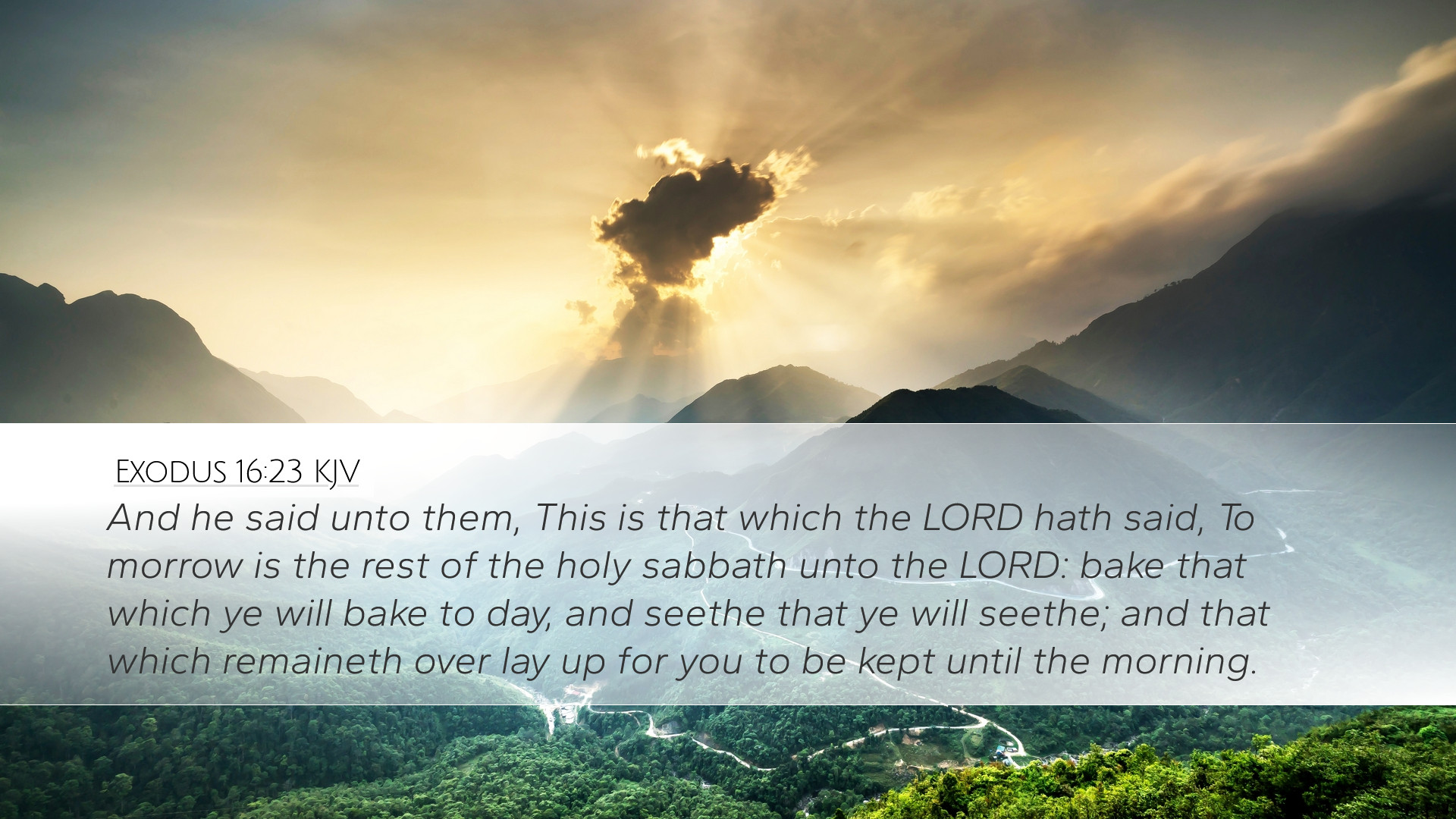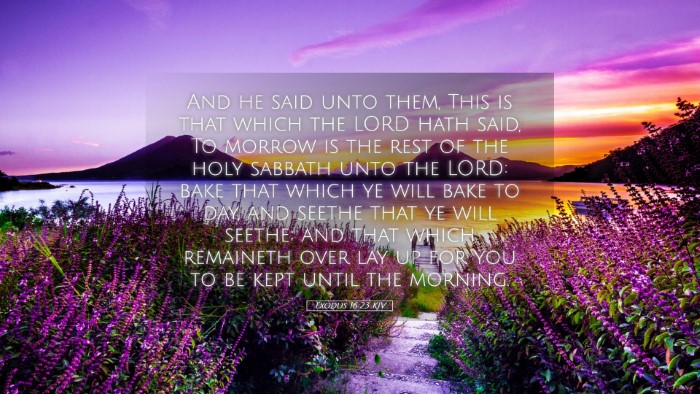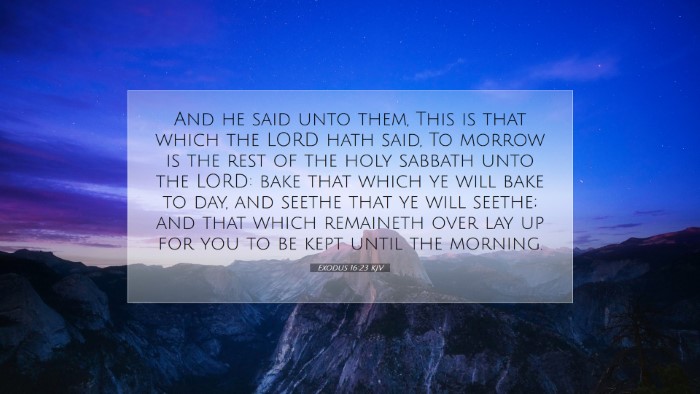Commentary on Exodus 16:23
Verse: Exodus 16:23 – "He said to them, 'This is what the LORD has said: Tomorrow is to be a day of sabbath rest, a holy sabbath to the LORD. So bake what you want to bake and boil what you want to boil. Save whatever is left and keep it until morning.'"
Introduction
The verse in Exodus 16:23 serves as a critical moment in the narrative of Israel's wilderness experience, highlighting the significance of observance and rest prescribed by God. It encapsulates not only the divine provision of manna but also the establishment of the Sabbath, pointing to the importance of rhythm and rest in the spiritual journey of God's people.
Context and Background
To understand Exodus 16:23, one must first consider the broader context of the Israelites’ journey through the wilderness after their exodus from Egypt. Here, they are grappling with survival in an inhospitable environment, and their need for sustenance leads to deeper spiritual lessons crafted by God.
The Divine Provision of Manna
The preceding verses establish that God is providing manna to sustain the people. This miraculous food signifies God’s care and sustenance in their time of need. It is noteworthy that the manna appears daily, fostering a reliance on God’s provision. The command to gather twice as much on the sixth day ties directly into the significance of the Sabbath, highlighting the notion that the Lord’s provision operates within the framework of divine order.
Insights from Commentators
Matthew Henry
Matthew Henry emphasizes the notion of God's command providing for both physical needs and spiritual observance. He notes that the instruction given in Exodus 16:23 relates directly to the Sabbath, a day set apart for rest and communion with God. Henry reflects on the human tendency to prioritize labor over rest and suggests that God’s command is a reminder that rest is essential for spiritual refreshment. He asserts:
"God, who created the world, rested on the seventh day and set this example for mankind, showing the nearness of His relation to our working lives."
Albert Barnes
Albert Barnes poignantly discusses the idea that the Sabbath is not merely a day of inactivity but a day which elicits remembrance and worship. He comments on the significance of the term 'Sabbath' which inherently suggests a cessation of regular work for a higher purpose. Barnes notes:
"The Sabbath serves as a reminder of both Creation and Redemption, instructing mankind in the proper order of time devoted not only to reflection and rest but also to the celebration of God's mighty acts."
Furthermore, Barnes indicates that the preparation outlined in the verse illustrates the need for diligence in preparing one’s heart and mind for the day of rest, which is vital for spiritual growth and renewal.
Adam Clarke
Adam Clarke provides insight into the logistical aspects of the Sabbath observance as outlined in this passage. He remarks on the unique arrangement of gathering and preparing food in relationship to the Sabbath and underscores the importance of the instructions given, particularly the directive to “bake what you want to bake.” Clarke emphasizes that such specifics not only show God’s concern for the practical needs of His people but also their need to honor His commandments:
"The preparation required before the Sabbath keeps the community engaged in both practical life and spiritual readiness, cultivating a culture of respect for God’s holy time."
Theological Significance
Exodus 16:23 illustrates profound theological themes, such as God's faithfulness, the pattern of work and rest, and the continual need for remembering God's provision. The Sabbath as instituted in this verse reflects God’s order in His creation, revealing a rhythm that is vital for both individual and communal life.
God’s Faithfulness and Provision
In observing the Sabbath, the Israelites were reminded of God’s past acts of deliverance and provision. The gathering of manna itself is a testament to God’s ongoing faithfulness, indicating that He provides for His people in times of need. This duality of spiritual and physical nourishment becomes a lasting principle for God's people.
Work and Rest
The instruction to not work on the Sabbath emphasizes a critical aspect of the life of faith. Rest is not merely a cessation of labor but a deliberate engagement with God. This concept can be influential for contemporary believers, encouraging them to prioritize spiritual life amidst the busyness of life’s demands. As Barnes notes, the Sabbath is a touchstone for the believers' reliance on divine sufficiency rather than human self-sufficiency.
Community and Worship
The prescription for Sabbath observance sets a communal rhythm that binds the Israelites together. The shared observance fosters a culture where worship becomes integral to daily life, allowing families and communities to collectively remember their faithfulness to God. Clarke highlights that community preparation for the Sabbath cultivates mutual encouragement and reverence.
Application for Today's Believers
Exodus 16:23 offers valuable lessons for modern pastors, students, theologians, and Bible scholars regarding the necessity of balancing work and rest in contemporary society. In a world that often glorifies busyness, the principle of sabbath rest reminds believers of their need for periodic renewal and reflection on God’s provisions.
- Encouragement to Observe Rest: This verse advocates for the purposeful inclusion of rest in personal and communal life. Believers today should cultivate spaces for Sabbath observance, enabling a productive rhythm of work and stillness.
- Training in Dependence on God: As the Israelites depended on God's provision, modern believers are invited into a deeper reliance on God amid uncertainty and challenges.
- Community Worship Practices: Establishing communal observances reinforces unity in faith and practice, making worship a shared experience rather than a solitary task.
Conclusion
The richness of Exodus 16:23 extends beyond its immediate narrative, inviting believers to contemplate God's provision, the sacred rhythm of life, and the essential nature of community worship. Through reflection on this passage, modern readers are reminded of the timeless need for obedience, rest, and reliance on God’s faithful provision, fostering a deeper engagement with their communal and spiritual lives.


